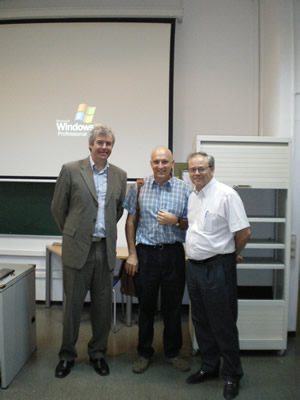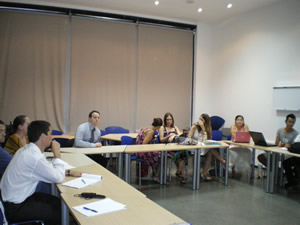Profesor Christian Vandenberghe (Management Department, HEC Montréal, Montréal, Québec , Canada), will present a number of seminars during his visit at the University of Valencia.
Seminar Title. Employee commitment, performance and turnover. July 7-13 2008. Faculty of Psychology (LCH). University of Valencia.
All the seminars have been supported by a grant from Spanish Agency of Innovation and Science, MICINN) and Banco Santander Central Hispano





Employee commitment, performance and turnover
Master/PhD Program on Work, Organizational, and Personnel Psychology
(teacher: Christian Vandenberghe, Full professor, HEC Montreal, Canada Research Chair in the management of employee commitment and performance)
The purpose of this seminar is to propose an overview of recent research and applications of the psychology of commitment, performance, and turnover in the workplace.
The seminar outline is divided as follows:
This section will be devoted to discussing the various conceptualizations of commitment that have emerged over time and what conceptualization authors are currently accepting as the one that makes most sense with respect to theory and research.
We will be reviewing commitment conceptualizations and distinguish among (a) commitment as behavioural consistency ( e.g., Becker, 1960; Kiesler, 1971), (b) attitudinal vs. behavioural commitment (e.g., Mowday, Porter, & Steers, 1982), (c) multiple bases of commitment (e.g., O'Reilly & Chatman, 1986; Meyer & Allen, 1991), and (d) integrative views on commitment (e.g., Meyer & Herskovitch, 2001).
We will also focus our attention on four important approaches to commitment that have developed over time and still remain influential on empirical research trends in the area of employee commitment: the view of commitment (a) as an exchange (e.g., Becker, 1960; Staw, 1997), (b) as an attitude (e.g., Blau, 1985; Sverke & Kuruvilla, 1995), (c) as a force (e.g., Brown, 1996; Meyer & Herscovitch, 2001), and (d) as a perceived bond (Klein, Molloy, & Cooper, in press; O'Reilly & Chatman, 1986).
We will suggest distinguishing among variables that are best viewed as antecedents or consequences of commitment rather than as integral parts of the concept itself. Likely antecedents include involvement, internalization, goal congruence, value congruence, support, while consequences are motivation, willingness to exert effort, drive, determination, persistence, loyalty, dedication, unwillingness to withdraw or abandon.
We will also propose a renewed conceptualization of the processes through which commitment may influence work outcomes. These processes involve goal orientation and approach and avoidance motivation as key intermediate processes through which commitment may influence work behaviour. This approach is partly based on Meyer, Becker, and Vandenberghe's (2004) integrative framework of employee commitment and motivation.
- A review of commitment antecedents
This section will cover the important antecedents associated with commitment and will namely include the following variables: value congruence, organizational justice, perceived organizational support, Human Resource Management practices, leadership, job characteristics, role stressors (ambiguity, conflict, and overload), investments, alternatives, and individual differences and personality.
We will also discuss how these variables likely influence and/or relate to commitment. For example, research has shown that some of the potential antecedents are more distal while others are more proximal to employee commitment. Such variables include HRM practices as the most distal ones and support and job characteristics as particularly proximal determinants.
This review will end up with a proposed integrative view of antecedent variables' direct and indirect effects on commitment forms or mindsets.
- Relationships between employee commitment and work outcomes
In this section, we intend to review research evidence concerning the impact of employee commitment on a variety of work outcomes including job or in-role performance, extra-role or discretionary performance, absenteeism, and turnover.
A particular attention will be devoted to examining potential moderators of these relationships (e.g., nature of samples, type of occupation, career stage, measurement of performance, time delay for tracking turnover data, etc.).
Another issue of relevance to understanding commitment's role in work behaviour is whether some forms of commitment interact in the prediction of work outcomes. For example, there has been some evidence in past research that continuance commitment (which is based on side bets) interact with the other forms (affective - based on desire - or normative - based on obligation - commitment) in predicting organizational citizenship behaviour and turnover intentions (e.g., Chen & Francesco, 2003; Gellatly, Meyer, & Luchak, 2006; Jaros, 1997; Meyer, Paunonen, Gellatly, Goffin, & Jackson, 1989; Randall, Fedor, & Longenecker, 1990).
Finally, our review will also address some neglected outcomes that we believe should be further investigated in the future in connection with employee commitment. These include stress and health, workplace violence, and creative performance, among others.
- Avenues for future research
These avenues will be advanced with the idea of furthering what we need to know on commitment and how this can contribute to a better understanding of commitment's role in current workplaces.
